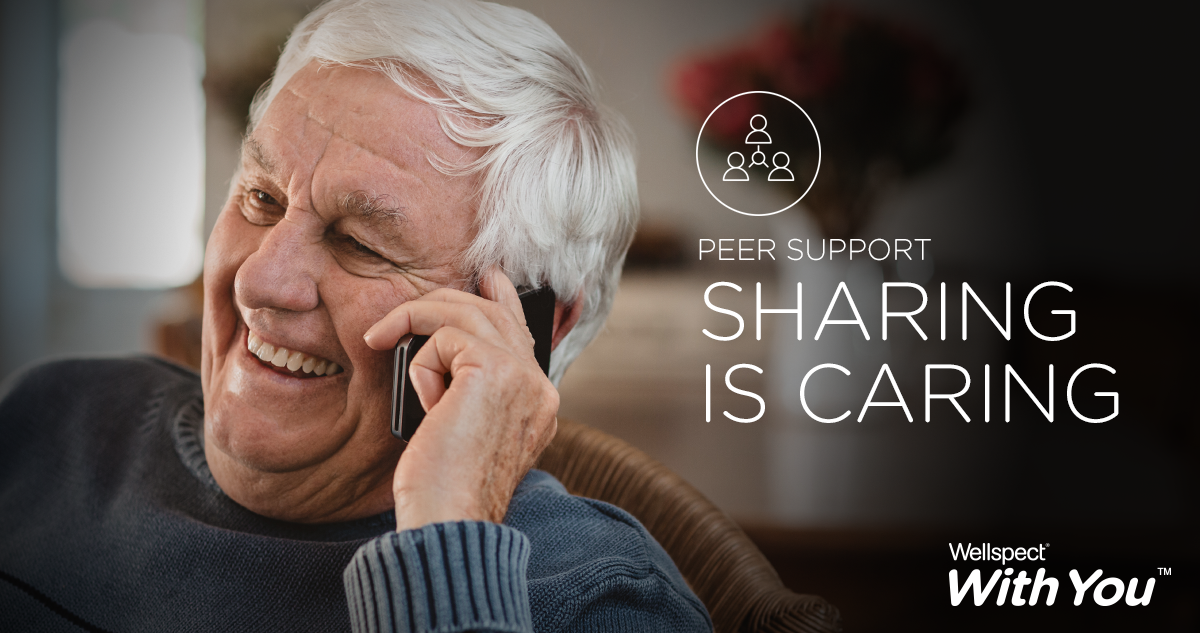Wellspect With You is our new service offering that combines customer support, product selection and delivery, and peer to peer services. Many of you who use our products and services suffer from bladder or bowel problems, caused by diagnoses such as a spinal cord injury, multiple sclerosis or an enlarged prostate. At Wellspect, our products and services are developed together with you, to help solve these continence issues. To give you more time to do what you love to do – more time for life.

Wellspect listens to our users, and the message is clear. Whether you have a spinal cord injury, Spina Bifida, Multiple Sclerosis or any condition that requires the use of Intermittent Catheterization (IC) for emptying the bladder or Transanal Irrigation (TAI) for emptying the bowel, you may have found that a lot of your questions, concerns and worries are not fully understood or explored in a healthcare setting. Here we will dig deeper into one of our ways to support our users as part of the Wellspect With You offering — our Peer to Peer services.
What is Peer to Peer support and why is it needed?
While knowledge and training surrounding bladder and bowel issues is improving, the users we talk to have certainly experienced a need for wider awareness of the issues they face. Together with Wellspect, they are initiating Peer to Peer services as part of Wellspect With You.
Everyone should be able to speak about their issues, whether it's physical, mental, or emotional.
Renée Torndal
In Sweden, Wellspect has enjoyed an enduring collaboration with Renée Torndal since 2016, a user, coordinator and cognitive behavioral therapist at a rehab company.
Having sustained a spinal cord injury ten years ago, Renée found that urgent questions surrounding bladder and bowel function weren't being talked about. As a neurogenic diagnosis impacts the whole picture of someone's life, a holistic approach is what is called for. As part of her work, Renée visits rehab centers and organizations for people with neurological diagnoses and injuries, and talks to service users and staff about the problems these people may face, and how they can get help and regain control. Often, one hand may go up in the audience, wanting to explore these issues, followed by several more.
When I enter in a wheelchair and begin to talk about the real issues, it carries authority and I make a connection, because they are aware that I really do know what I am talking about — I know how it is.
Knowledge in how to train a user to use IC and TAI varies from region to region, and adherence to a therapy can also vary — often depending how closely the user was supported. These products and therapies make a real difference to a user's quality of life, but that improvement can often be lost if a user doesn't get the right support and expertise.
For example, a patient might not use an irrigation system because they don't know how — they try it three times and say: "it didn't work" and then I show them how to do it — we change the angle, the positioning, the environment, so it's optimized for them, and they continue to use it and gain that benefit in their life.
Time and time again, Renée has seen the same snowball effect at her presentations, and decided to establish a facebook group for those with neurogenic conditions. In partnership with Wellspect, Renée is piloting an initiative for the user community to gather, share and support each other. And the name for this scheme? Elefanten i rummet — the Elephant in the room.
And it can't come soon enough — the pandemic has seen critical services redeployed to the front lines, so there is a huge demand from users for information, training, sign posting and support.
In the UK, Bev Collins, an experienced specialist nurse, teamed up with Kerry Lloyd, who uses IC and TAI products. Kerry has Multiple Sclerosis, and had been advising other users about how to navigate the healthcare services, as well as how to use the products.
When a nurse gives somebody some advice, it can sometimes sound a little bit patronizing.
Bev Collins, Specialist Clinical Nurse
"And that's not saying that as nurses we're being disrespectful at all, but sometimes I think it's just more acceptable to the user to hear it from a peer" says Bev.
Kerry uses both IC and TAI and would reassure fellow users and answer their concerns. It's just got so much more weight behind it and I think it's also so much more respectful when someone else with the same condition and circumstances can fully empathize, listen and advise than when a professional attempts to reassure.
Starting off with just Kerry advising woman to woman, the network has expanded to a team of five, with two men having joined recently. The team includes a Wellspect Marketing Manager, and a former paralympian and a Wellspect Nursing Coordinator — all of whom are users.
As Bev says:
Testimony direct from the user — you can't argue with the power of that.





